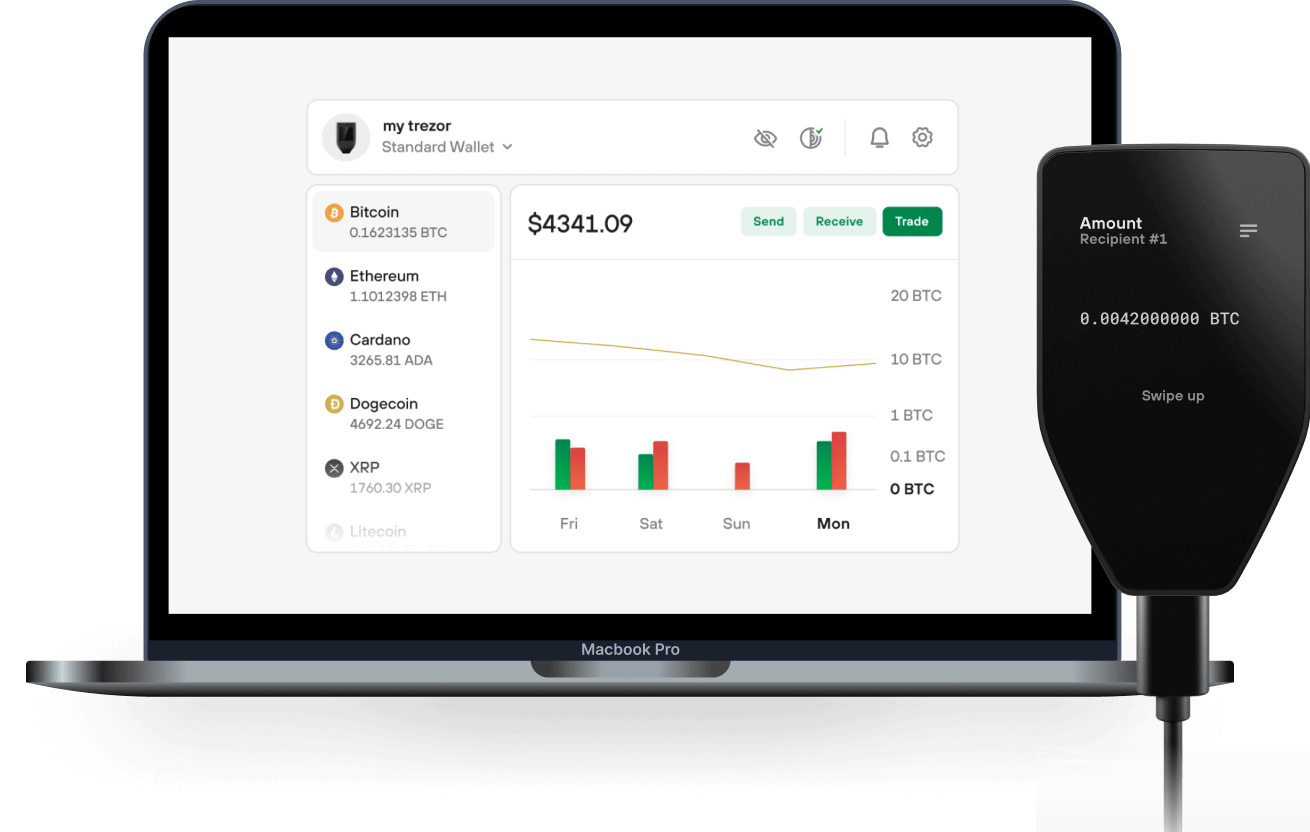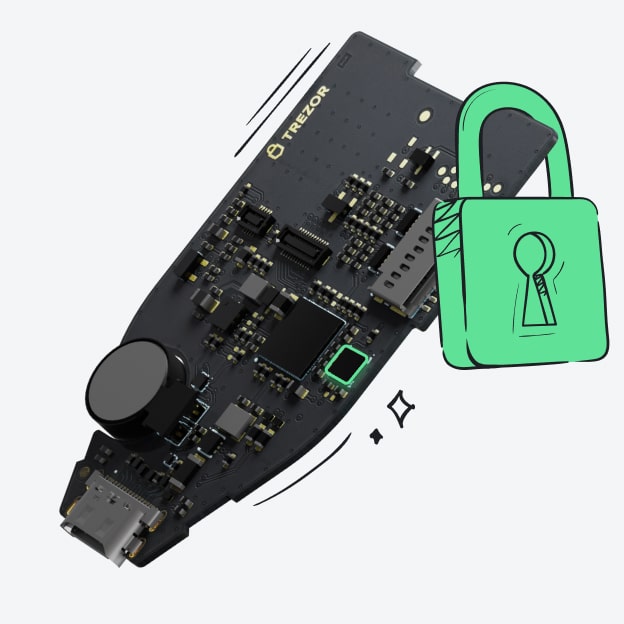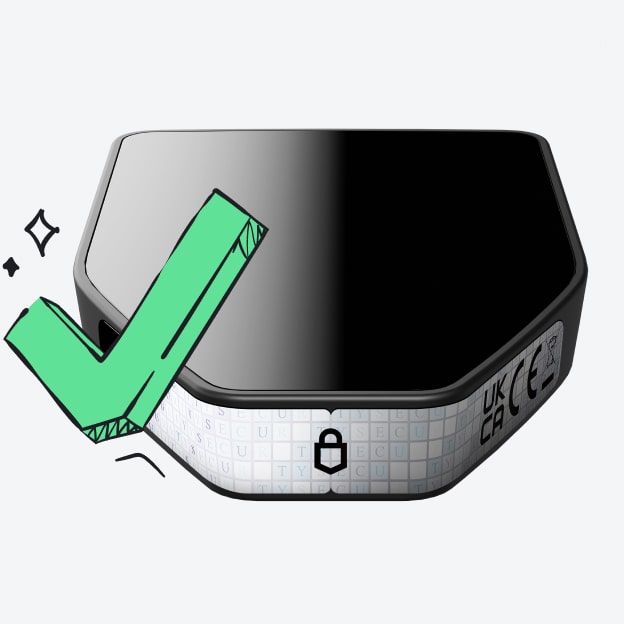Safe & secure Cardano wallet
Take control of your Cardano assets with complete confidence in the Trezor ecosystem.
- Secured by your hardware wallet
- Use with compatible hot wallets
- Trusted by over 2 million customers

Buy, manage & stake your Cardano with the Trezor Suite app

Send & receive

Buy, sell, swap & stake
Trezor hardware wallets that support Cardano
Sync your Trezor with wallet apps
Manage your Cardano with your Trezor hardware wallet synced with several wallet apps.
Trezor Suite
AdaLite
Supported Cardano Networks
- Milkomeda (Cardano)
- Cardano
Why a hardware wallet?
Go offline with Trezor
- You own 100% of your coins
- Your wallet is 100% safe offline
- Your data is 100% anonymous
- Your coins aren’t tied to any company
Online exchanges
- If an exchange fails, you lose your coins
- Exchanges are targets for hackers
- Your personal data may be exposed
- You don’t truly own your coins
How to ADA on Trezor
Connect your Trezor
Install Trezor Suite

Transfer your ADA

Make the most of your ADA
Trezor keeps your ADA secure
 Protected by Secure Element
Protected by Secure ElementThe best defense against both online and offline threats
 Your tokens, your control
Your tokens, your controlAbsolute control of every transaction with on-device confirmation
 Security starts with open-source
Security starts with open-sourceTransparent wallet design makes your Trezor better and safer
 Clear & simple wallet backup
Clear & simple wallet backupRecover access to your digital assets with a new backup standard
 Confidence from day one
Confidence from day onePackaging & device security seals protect your Trezor’s integrity
Cardano for scalability & sustainability<br />
The Cardano network - Cardano utilizes a unique proof-of-stake consensus mechanism (Ouroboros) designed to scale efficiently, handling large transaction volumes while minimizing energy consumption. - Built on peer-reviewed research and formal verification, Cardano ensures high levels of security and a solid foundation for decentralized applications (dApps). - With its focus on eco-friendly proof-of-stake and a treasury system for funding future development, Cardano ensures long-term viability and community-driven growth.<br /> <br /> User-friendly access with Trezor Suite - Trezor Suite offers robust security for Cardano users by integrating hardware wallets, ensuring private keys are never exposed to online threats. - Trezor Suite supports not only Cardano (ADA) but also a wide range of other cryptocurrencies, providing users with a consolidated platform for managing their assets. - With its straightforward user interface, Trezor Suite makes it easy for both novice and experienced users to manage their Cardano holdings securely and efficiently.<br /> <br /> Third-party wallet apps for Cardano users - AdaLite, Daedalus, and Yoroi offer a range of wallet solutions catering to different user needs, from web-based and lightweight options (AdaLite) to full-node, desktop solutions (Daedalus), and fast, mobile-friendly apps (Yoroi). - All three wallets support integration with hardware wallets like Trezor and Ledger, providing an extra layer of security for users holding Cardano (ADA) assets. ## Cardano in a nutshell Cardano is a decentralized blockchain platform designed to offer a secure and scalable foundation for building decentralized applications (DApps) and smart contracts. It stands out for its research-based development, which is organized into phases, each improving different parts of the network. The platform's native cryptocurrency is ADA, and it uses a proof-of-stake (PoS) consensus mechanism called Ouroboros. Cardano is supported directly in the Trezor Suite and Trezor Suite Lite apps.
Communities
Frequently asked questions
How do you buy Cardano?
Buying Cardano (ADA) is seamless with a Trezor hardware wallet. Using Trezor Suite, users can navigate to the “Buy & sell” tab and select a compatible exchange powered by Invity.io.
How do you stake Cardano?
You can stake your Cardano directly in Trezor Suite. In your Cardano account, navigate to the Staking tab and hit the Delegate button. Learn more about Staking Cardano on the Trezor Knowledge Base.
How does Cardano staking work?
With the Trezor Suite app, ADA holders can stake either individually or delegate their ADA to a staking pool. Staking pools are formed by groups of ADA holders, who combine their ADA to increase their chance of being chosen to produce new blocks and validate transactions. After delegating, users earn rewards in the form of additional ADA coins. These rewards are usually paid out approximately every 5 days (equivalent to one epoch). Users can unstake and re-delegate to another pool if desired.
How many Cardano (ADA) coins are there?
Cardano will have a maximum supply of 45 billion ADA.
When will Cardano reach maximum supply?
Cardano is designed to gradually reach its maximum total supply of 45 billion ADA through a process called "monetary expansion." There is no specific date for when this maximum supply will be reached, but it is expected to take several decades following the launch of the Cardano project.
Which wallet is best for Cardano?
When it comes to securely storing and managing Cardano (ADA), Trezor is the trusted choice. As one of the leading hardware wallets in the crypto space, Trezor provides exceptional security by keeping access to your ADA offline, protecting it from hacks and malware.
With the Trezor Suite app, you can easily send, receive, and manage your ADA while enjoying a user-friendly interface and advanced security features. Additionally, Trezor allows you to stake ADA directly within the app, enabling you to earn rewards while maintaining control over your funds. For anyone serious about safeguarding their cryptocurrency, Trezor stands out as one of the best wallets available for Cardano.
How do I add Cardano to my wallet?
To add Cardano (ADA) to your wallet, you have two convenient options with Trezor. First, you can send Cardano from another wallet or exchange directly to your Trezor device. To do this, simply open the Trezor Suite app, select Cardano, and generate a receive address. Copy this address and use it to initiate the transfer from your existing wallet or exchange.
Alternatively, you can buy Cardano directly within the Trezor Suite app. Navigate to the “Buy & sell” tab, enter the amount of fiat currency you wish to spend on ADA, and choose a compatible exchange. Follow the on-screen instructions to complete the purchase, and the Cardano will be securely added to your Trezor wallet. Both options ensure that your ADA is stored safely and managed effectively.
